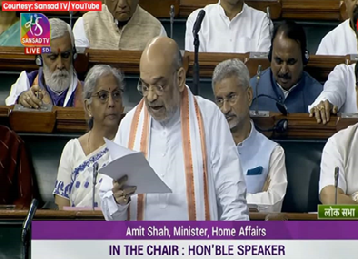#WATCH | Union Home Minister Amit Shah speaks on Bharatiya Nyaya Sanhita Bill, 2023; The Bharatiya Sakshya Bill, 2023 and The Bharatiya Nagrik Suraksha Sanhita Bill in Lok Sabha.
— ANI (@ANI) August 11, 2023
He says, "From 1860 to 2023, the country's criminal justice system functioned as per the laws made… pic.twitter.com/TIcoeaXvjG
- Amit Shah’s introduction of the three new bills signifies a historic moment in Indian legislative reforms, aiming to replace laws rooted in colonial history.
- The Bharatiya Nyaya Sanhita Bill seeks to replace the Indian Penal Code, a cornerstone of criminal law in India since 1860.
- The Bharatiya Nagrik Suraksha Sanhita Bill is intended to replace the Code of Criminal Procedure, which has been in effect since 1898.
- The Bharatiya Sakshya Bill aims to replace the Indian Evidence Act, a law enacted in 1872 that governs rules of evidence in legal proceedings.
- Shah’s statement about ending laws brought by the British highlights the post-colonial intention to assert India’s legal sovereignty.
- By proposing these bills, Shah and the government aim to create a modern legal framework that aligns with contemporary societal values and needs.
- The replacement of these laws indicates a commitment to address evolving challenges in crime, justice, and human rights.
- The bills’ introduction in the Lok Sabha demonstrates the government’s resolve to revamp the country’s legal foundation.
- Amit Shah’s plan to send the bills to the standing committee signifies a thorough evaluation process, allowing for expert opinions and public input.
- The proposed reordering of the legal framework to prioritize crimes against women and children reflects a progressive and human-centric approach.
- The transformation of the criminal justice system, as envisaged by Shah, is poised to create a more inclusive, just, and responsive legal environment.
- These bills could mark a turning point in India’s legal history, aligning its justice system more closely with contemporary national values and aspirations.

